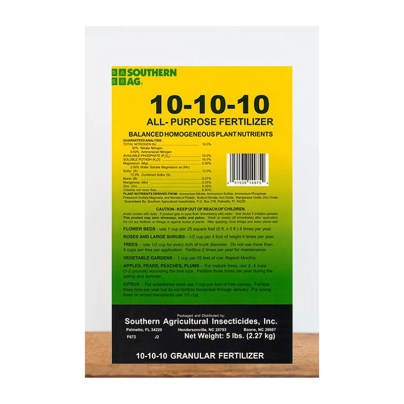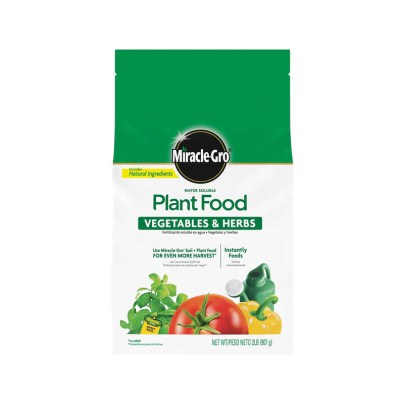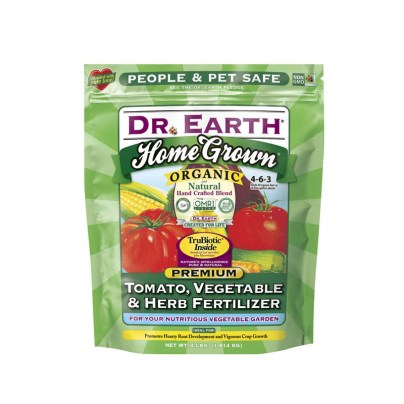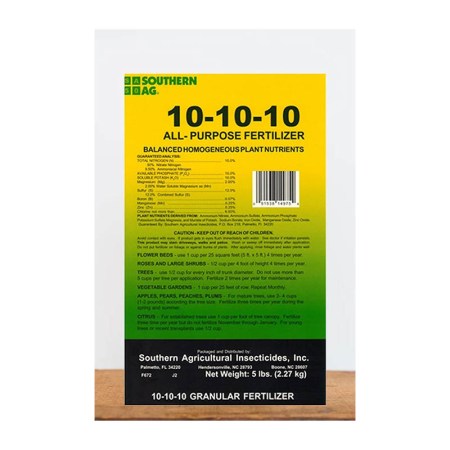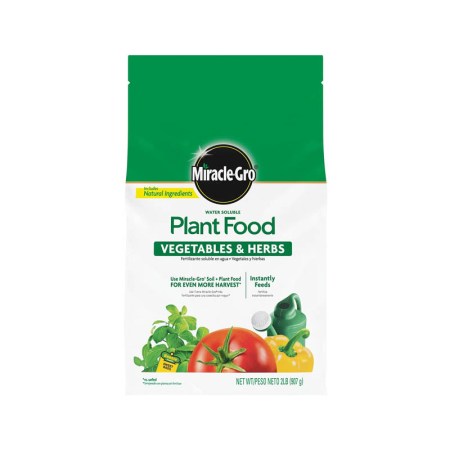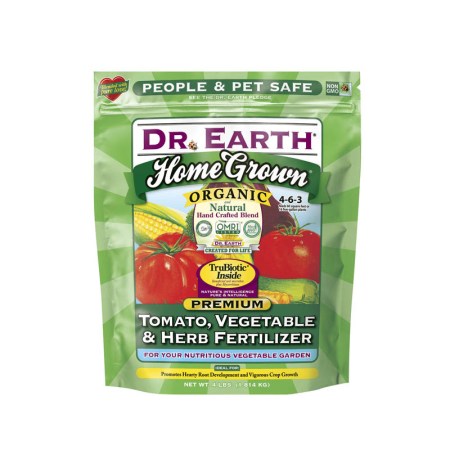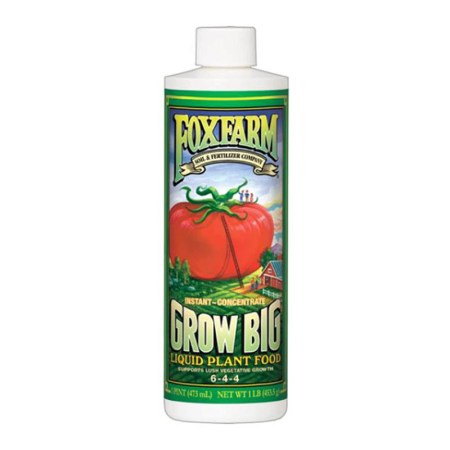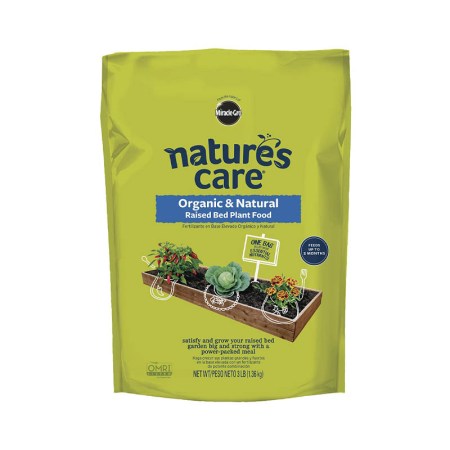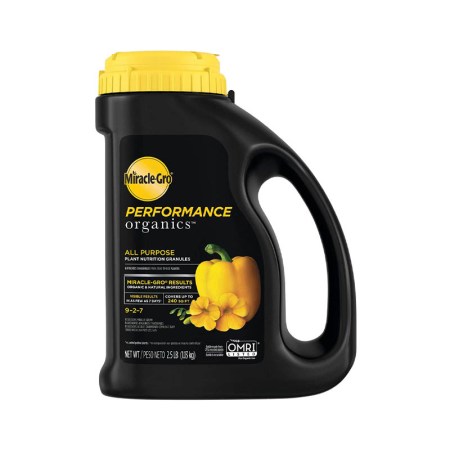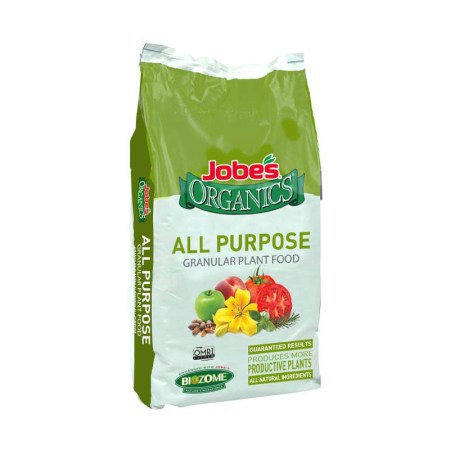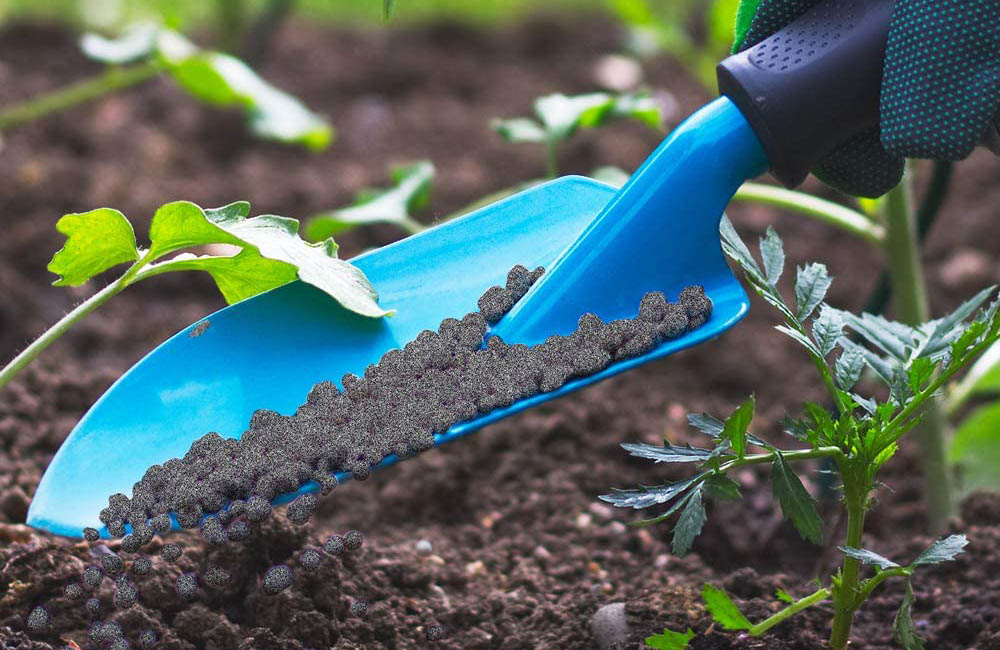
We may earn revenue from the products available on this page and participate in affiliate programs. Learn More ›
Growing potatoes is typically reserved for experienced gardeners because this tuber crop tends to be a bit finicky in terms of care requirements. Potatoes thrive in temperatures between 50 and 70-degrees Fahrenheit, require full sun, and need a loose, well-draining soil. Fertilizing is particularly important for potato crops, since they have somewhat high-maintenance nutrient needs. They need to be fertilized four to five times throughout their life cycle, and many farmers and gardeners use a different fertilizer blend each time.
With so many fertilizers available, it can be difficult for shoppers to narrow down their options. These recommendations for the best fertilizer for potatoes were selected for their quality, versatility, value, and ease of use. Keep reading to learn about the top features to consider when shopping, and then explore our picks for the best potato fertilizers on today’s market.
- BEST OVERALL: Southern Ag All Purpose Granular Fertilizer
- BEST VALUE: Miracle-Gro Water Soluble Plant Food
- BEST ORGANIC: Dr. Earth Organic Tomato, Vegetable & Herb Fertilizer
- BEST LIQUID: Fox Farm 6-4-4 Grow Big Liquid Concentrate Fertilizer
- BEST FOR RAISED BEDS: Nature’s Care Organic & Natural Raised Bed Plant Food
- BEST ALL-PURPOSE: Miracle-Gro Performance Organics Plant Nutrition
- BEST LARGE QUANTITY: Jobe’s Organics All-Purpose Granular Fertilizer
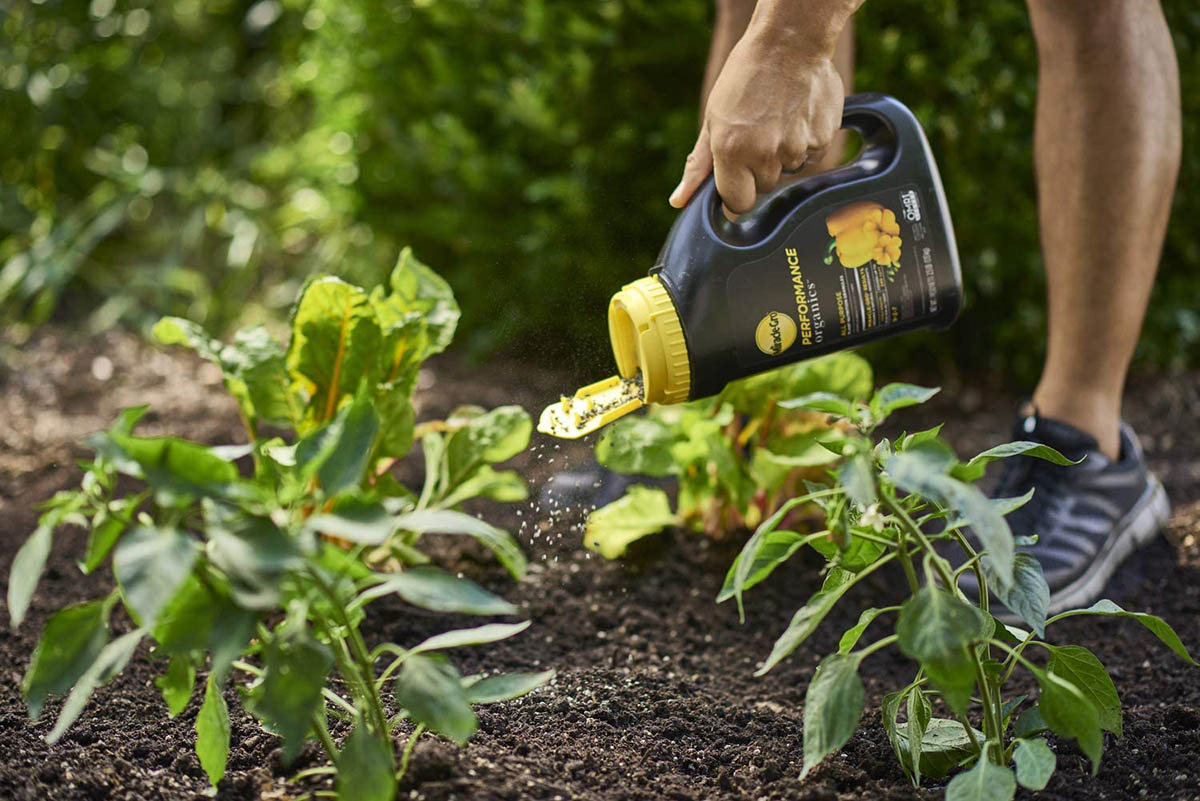
What to Consider When Choosing Fertilizer for Potatoes
While it’s easy to assume that all vegetable fertilizers offer similar performance, a number of factors affect their functionality. Just ahead are several of the most important features to consider when choosing the best potato fertilizer for your yard or farm.
Types
When it comes to choosing a fertilizer, gardeners have two primary types to choose from: liquid and granular.
- Granular fertilizers come in pellets or coarse powders and release nutrients over time, which is ideal for ensuring a proper balance of nutrition over a plant’s life cycle.
- Liquid fertilizers act quickly and are immediately absorbed by the plants in your garden.
Gardeners also have to decide whether they want to use organic and inorganic fertilizers—or a combination of the two. Organic fertilizers contain no chemicals and are made from completely natural ingredients. One of the biggest perks of organic fertilizers is that they continue to condition the soil over time. Most products on the market, however, are inorganic, and utilize powerful chemicals that are expertly formulated to make soil ideal for growing vegetables. It’s important to avoid fertilizers that include a weed killer, since this may also kill your growing potato plants.
Nutrients
Before choosing a potato fertilizer, it’s prudent to test your land’s soil to see which nutrients it’s lacking. The following nutrients are generally beneficial to potatoes when balanced in the appropriate ratios:
- Nitrogen stimulates stem and leaf development in plants, though an excess of nitrogen can negatively impact tuber growth.
- Phosphorus results in higher tuber yields.
- Potassium impacts plant output and reduces black spots.
- Magnesium improves the growing conditions of sandy, low-pH soils.
- Manganese helps to add acidity to high-pH soils.
- Boron helps potato plants absorb calcium from the soil and improves potato skin texture.
Season and NPK Ratio
Potato plants take between 3 and 4 months to develop, and throughout their growing process, their fertilization needs change. Consider the ideal NPK ratio, which is the percentage of nitrogen (N), phosphorus (P), and potassium (K)) for each stage of growth. When planting, an NPK ratio of 15-15-15 is ideal. A month or two after they’ve been planted, potatoes need lots of nitrogen, so a fertilizer with an NPK of 34-0-0 is the best choice. An NPK of 12-12-17 or 14-7-21 is best for the last couple of months before harvest when the plants require more potassium.
pH Level
The ideal soil pH level for growing potatoes is slightly acidic, between 4.8 and 6.5. It’s important to test the pH level of your soil before planting, to establish whether a fertilizer is needed to raise or lower pH levels. If the pH is too high, apply a horticultural sulfur to the planting area before planting in order to quickly lower it. Throughout the growing season, choose a fertilizer containing manganese, which will keep pH levels low.
Amount of Fertilizer
The amount of fertilizer gardeners should apply depends on the size of their garden and the quality of their soil. Generally speaking, a 1,000-square-foot potato garden requires approximately 25 pounds of fertilizer over the plants’ lifespan. Gardeners can use that figure to calculate how much fertilizer their specific plot of land requires.
Our Top Picks
Now that you’ve learned more about potato fertilizers, it’s time to start shopping. The following items are the top picks for the best potato fertilizers for your garden.
Best Overall
Southern Ag All Purpose Granular Fertilizer
Southern Ag’s granular fertilizer comes in a 5-pound bag and releases nutrients slowly over time, allowing gardeners to fertilize less frequently. It features a 10-10-10 balance of nitrogen, phosphorus, and potassium, meaning this is an all-purpose blend that works for both edible and nonedible plants. This balanced formula makes the Southern Ag fertilizer ideal for the initial fertilization process when the potatoes are planted.
To use, broadcast the granules over the garden plot and water them into the soil. The manufacturer recommends using 1 cup of fertilizer per 25 square feet of land.
Product Specs
- Type: Granular
- NPK Ratio: 10-10-10
- Quantity: 5 pounds
Pros
- Well-balanced trifecta fertilizer
- Good for all-purpose use
- Affordable price
Cons
- Only one size available
Get the Southern Ag potato fertilizer on Amazon and at Walmart.
Best Value
Miracle-Gro Water Soluble Plant Food
This natural fertilizer from Miracle-Gro features a unique, water-soluble formula that makes for easy application and gives plants an instant nutrient boost. With an NPK ratio of 18-18-21, it’s perfect for applying at the beginning of the growing season or in the last couple of months of growth when the potato plants require more potassium.
While it works well for potatoes, it’s also versatile enough to feed the other vegetables, fruit, and herbs in a garden. Miracle-Gro recommends applying this fertilizer every 1 to 2 weeks during the growing season. The 2-pound bag should feed 800 square feet.
Product Specs
- Type: Water-soluble
- NPK Ratio: 18-18-21
- Quantity: 2 pounds
Pros
- Well-balanced 18-18-21 formula
- Good for all-purpose use
- Affordable price
Cons
- Only one size available
Get the Miracle-Gro potato fertilizer at Amazon, The Home Depot, and Walmart.
Best Organic
Dr. Earth Organic Tomato, Vegetable u0026 Herb Fertilizer
Those looking for the best organic fertilizer option should consider this formula from Dr. Earth. It contains probiotics, seven strains of soil microbes, and ecto and endo mycorrhizae (beneficial funguses), all of which contribute to a richer, more nutrient-dense soil. This formula is certified by the OMRI (Organic Material Review Institute) as well as the CCOF (California Certified Organic Farmers) as being organic and non-GMO.
Since it’s free of chemicals and synthetic ingredients, this product, which has an NPK ratio of 4-6-3, is safe to use around children and pets. In fact, it’s made from feed-grade ingredients, so it’s not a problem if your livestock gets into it.
Product Specs
- Type: Granular
- NPK Ratio: 4-6-3
- Quantity: 4 pounds
Pros
- Totally organic formula
- Good for all-purpose use
- Non-GMO or synthetic chemicals
- Slow-release nutrients
Cons
- Low NPK percentage
Get the Dr. Earth potato fertilizer at Amazon, The Home Depot, and Walmart.
Best Liquid
Fox Farm 6-4-4 Grow Big Liquid Concentrate Fertilizer
Fox Farm’s liquid fertilizer is versatile, containing earthworm castings, Norwegian kelp, and essential micronutrients with an NPK ratio of 6-4-4. This formula is best for the middle of a potato plant’s growth cycle because of its high proportion of nitrogen.
For the best results, the manufacturer recommends adding 2 teaspoons of liquid fertilizer to every gallon of water and applying the mixture every other time you water the garden. The fertilizer should only be applied once the new plantings have had a few days to settle in.
Product Specs
- Type: Liquid
- NPK Ratio: 6-4-4
- Quantity: 1 pint
Pros
- Can be used on both vegetables and flowers
- Concentrated formula
- Features high-quality ingredients
Cons
- Small size
Get the Fox Farm potato fertilizer on Amazon and at Walmart.
Best for Raised Beds
Nature's Care Organic u0026 Natural Raised Bed Plant Food
Vegetables grown directly in native soil have a nutritional advantage, whereas those grown in containers or raised beds need an extra boost of nutrients in order to thrive. This formula from Nature’s Care has an NPK ratio of 10-2-8, making it ideal for the first couple of months of potato plant growth.
To use, sprinkle half a cup of the granules into each square foot of raised bed and work them into the top 6 inches of soil before watering thoroughly. At each subsequent feeding, use a quarter cup of fertilizer per square foot. The 3-pound bag should be sufficient to feed a 4-foot by 4-foot raised bed for approximately 2 months.
Product Specs
- Type: Granular
- NPK Ratio: 10-2-8
- Quantity: 3 pounds
Pros
- All-purpose formula
- High nutrient percentage
- Specially formulated for raised beds
Cons
- Granules must be worked into the soil
Get the Nature’s Care potato fertilizer on Amazon.
Best All-Purpose
Miracle-Gro Performance Organics Plant Nutrition
Those with small gardens who are looking for a single fertilizer will be well served by this versatile option from Miracle-Gro, which caters to both flowers and edible plants. The built-in shaker applicator makes it easy to sprinkle the granules evenly throughout the garden.
For in-ground gardening, simply scatter the granules and then work them into the top 3 inches of soil. For container gardens, mix 2 tablespoons of fertilizer into every gallon of soil at the time of planting. If plants are already established, follow the instructions for in-ground gardens. Reapply the fertilizer every 4 to 6 weeks for the best results.
Product Specs
- Type: Granular
- NPK Ratio: 9-2-7
- Quantity: 2.5 pounds
Pros
- Suitable for containers or native soil
- Good for all-purpose use
- Convenient built-in applicator
Cons
- Only one size available
Get the Miracle-Gro potato fertilizer at Amazon, The Home Depot, and Walmart.
Best Large Quantity
Jobe’s Organics All-Purpose Granular Fertilizer
With its 16-pound quantity and NPK ratio of 4-4-4, this bag of all-purpose fertilizer by Jobe’s Organics is an excellent all-around pick for most gardeners, whether they’re growing flowers, fruits, or vegetables. It’s completely organic, being certified by the OMRI, with a fast-acting granular formula. Due to its all-natural makeup, it’s safe to use around young children and pets.
The formula is designed to improve nutrient absorption; help plants resist pests; promote root growth; and create a healthy, diverse ecosystem in the garden. The bag is resealable, keeping the fertilizer fresh for longer.
Product Specs
- Type: Granular
- NPK Ratio: 4-4-4
- Quantity: 16 pounds
Pros
- Well-balanced 4-4-4 formula
- Good for all-purpose use
- Affordable price
- Smaller sizes available
Cons
- Low nutrient density
Get the Jobe’s Organics potato fertilizer on Amazon and at Walmart.
Our Verdict
After reviewing our guide, you’ll know more about shopping for fertilizer for your potatoes. We recommend the Southern Ag granular fertilizer for its balanced NPK ratio and excellent value. Those on a budget will appreciate the Miracle-Gro plant food, which offers top-notch quality at an affordable price.
How We Chose the Best Fertilizer for Potatoes
Years of experience covering home and garden products as well as extensive product research went into creating this guide. We explored more than 40 fertilizer options and weighed a number of practical considerations before making our recommendations.
We aimed to include fertilizers with a high number of nutrients and made sure to feature options with a variety of NPK blends for different times in the growing cycle. We took customer reviews into consideration when making our recommendations, ensuring users had a positive experience with the fertilizer in terms of performance, ease of use, and ultimate yield.
Additionally, growing your own vegetables should save money for your household. We aimed to include fertilizers that offered excellent value based on their quality and quantity.
FAQs
While you now know more about choosing the best potato fertilizer, you might need more information about how to use it. Here are answers to some of the most frequently asked questions about fertilizing potatoes.
Q: When should I start fertilizing my potatoes?
Fertilize the soil before planting, if needed. Alternatively, fertilize simultaneously while planting.
Q: How much fertilizer should I use on potatoes?
A 1,000-square-foot plot requires approximately 25 pounds of fertilizer throughout the season.
Q: How do I apply fertilizer to potatoes?
The application depends on the type of fertilizer being used. Liquid fertilizers are meant to be mixed with water and applied while watering. Granular fertilizers are sprinkled on top of the soil or mixed into the soil before planting.
Q: How do you increase the yield of a potato crop?
Increase your potato crop’s yield by initially cutting your seed potatoes into small pieces, about the size of a standard ice cube, and starting them in a warm area. Throughout the growing season, ensure the soil is well fertilized and isn’t allowed to dry out.
Q: Is Epsom salt good for potatoes?
Yes, Epsom salt contains magnesium, which is beneficial for potatoes and improves growing conditions.
Q: Do potatoes like coffee grounds?
Adding coffee grounds to your compost blend is a great way to increase growth.
